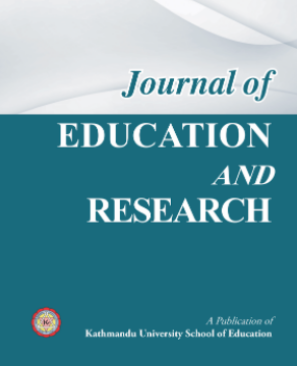
Menstrual Experiences of Totally Blind Menstruators in Kathmandu
Original Article
Journal of Education and Research, Volume 11, Issue 2, 2021, 89-105, https://doi.org/10.51474/jer.v11i2.560
Publication date: Jan 18, 2022
Views: 444 | Downloads: 293
How to cite this article
APA
In-text citation: (Pant, 2021)
Reference: Pant, P. (2021). Menstrual Experiences of Totally Blind Menstruators in Kathmandu. Journal of Education and Research, 11(2), 89-105. https://doi.org/10.51474/jer.v11i2.560
Reference: Pant, P. (2021). Menstrual Experiences of Totally Blind Menstruators in Kathmandu. Journal of Education and Research, 11(2), 89-105. https://doi.org/10.51474/jer.v11i2.560
Vancouver
In-text citation: (1), (2), (3), etc.
Reference: Pant P. Menstrual Experiences of Totally Blind Menstruators in Kathmandu. Journal of Education and Research. 2021;11(2):89-105. https://doi.org/10.51474/jer.v11i2.560
Reference: Pant P. Menstrual Experiences of Totally Blind Menstruators in Kathmandu. Journal of Education and Research. 2021;11(2):89-105. https://doi.org/10.51474/jer.v11i2.560
AMA
In-text citation: (1), (2), (3), etc.
Reference: Pant P. Menstrual Experiences of Totally Blind Menstruators in Kathmandu. Journal of Education and Research. 2021;11(2), 89-105. https://doi.org/10.51474/jer.v11i2.560
Reference: Pant P. Menstrual Experiences of Totally Blind Menstruators in Kathmandu. Journal of Education and Research. 2021;11(2), 89-105. https://doi.org/10.51474/jer.v11i2.560
Chicago
In-text citation: (Pant, 2021)
Reference: Pant, Poonam. "Menstrual Experiences of Totally Blind Menstruators in Kathmandu". Journal of Education and Research 2021 11 no. 2 (2021): 89-105. https://doi.org/10.51474/jer.v11i2.560
Reference: Pant, Poonam. "Menstrual Experiences of Totally Blind Menstruators in Kathmandu". Journal of Education and Research 2021 11 no. 2 (2021): 89-105. https://doi.org/10.51474/jer.v11i2.560
Harvard
In-text citation: (Pant, 2021)
Reference: Pant, P. (2021). Menstrual Experiences of Totally Blind Menstruators in Kathmandu. Journal of Education and Research, 11(2), pp. 89-105. https://doi.org/10.51474/jer.v11i2.560
Reference: Pant, P. (2021). Menstrual Experiences of Totally Blind Menstruators in Kathmandu. Journal of Education and Research, 11(2), pp. 89-105. https://doi.org/10.51474/jer.v11i2.560
MLA
In-text citation: (Pant, 2021)
Reference: Pant, Poonam "Menstrual Experiences of Totally Blind Menstruators in Kathmandu". Journal of Education and Research, vol. 11, no. 2, 2021, pp. 89-105. https://doi.org/10.51474/jer.v11i2.560
Reference: Pant, Poonam "Menstrual Experiences of Totally Blind Menstruators in Kathmandu". Journal of Education and Research, vol. 11, no. 2, 2021, pp. 89-105. https://doi.org/10.51474/jer.v11i2.560
ABSTRACT
Many communities still consider menstruation as a taboo, and thus various restrictions are imposed on menstruators during their menstruation. Despite their challenges, the totally blind menstruators, too, are not spared from the restrictions. This paper presents the findings of a study on menstrual experiences of five totally blind menstruators in Kathmandu, Nepal. Managing their menstruation independently amidst the social and cultural restrictions is far more difficult for blind menstruators because of their needs in terms of support from the family members and physical infrastructures like bathrooms and toilets. The restrictive practice of keeping them in isolation away from their families, whom they rely upon for their day-to-day activities, for up to 22 days during their menarche (first period) not only snatches away their comforts and convenience but also makes them insecure and causes emotional trauma. Ensuring safe and dignified menstruation for blind menstruators needs wider awareness on the realities of menstruation in society, understanding and supportive role of the family, particularly the non-menstruating members, and the appropriate physical infrastructures.
REFERENCES
---
LICENSE
This work is licensed under a Creative Commons Attribution 4.0 International License.
